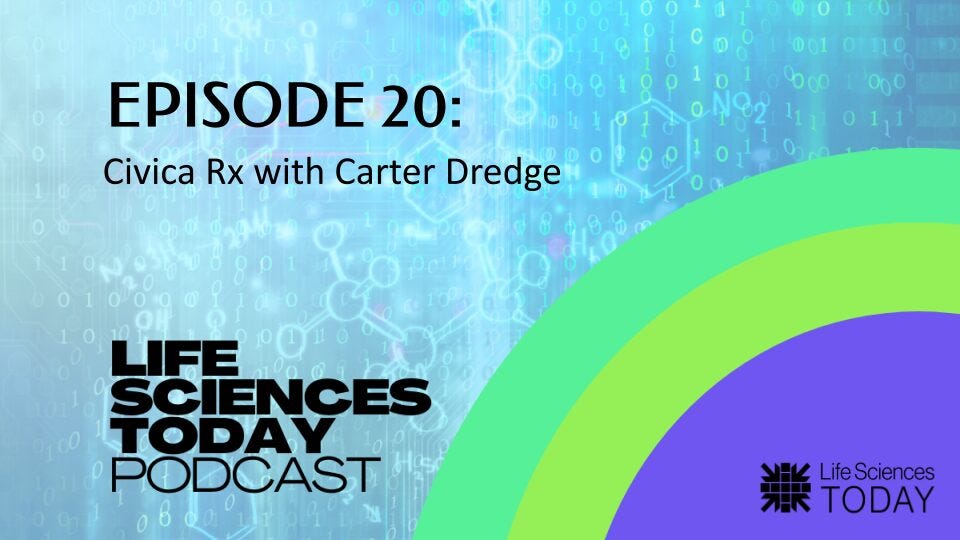You can’t scale clinical success on unreliable data
CROs protect their margins — not your biomarkers. Here’s how to flip the script.
Photo by Paulino Acosta Santana
This week on Life Sciences Today
For this week's episode of the Life Sciences Today podcast, John Lynn, Founder of Healthcare IT Today, chats with Carter Dredge from the Intermountain Health Institute. Dredge and his team at Intermountain Health Institute took a really unique approach to creating the life sciences company Civica Rx that focuses on generic drugs that have a supply shortage.
What makes it particularly unique is their goal is to be sustainable, not to make a profit. It's a fascinating approach to creating drugs and created a new model he calls a health data utility.
Check out the latest episode of Life Sciences Today with Civica RX to learn about this unique approach to ensuring that healthcare organizations don't have a supply shortage of important generic drugs and are able to lower the cost of those drugs.
Back to the future
I worked at Intel in Jerusalem in the 90s. My last job was telecom manager for the Israel site. We did modernization projects all the time it seemed.
One was improving the quality of PC support and maintenance by outsourcing.
This might sound strange. After all, Intel makes the chips that go into PCs and boards as well.
Why should we outsource Intel PC support?
Because personal computers are not core business for Intel.
It’s that simple. You don’t outsource your core IP.
You can outsource everything else as long as you control the service level objectives of your outsourcing vendor - which we did with the vendor that won the Intel RFP for PC maintenance and support.
This week, I will not talk about SLOs (which most CROs keep in the breach).
I’ll talk about clinical data as core IP for a drug company.
Modernization is about everyone becoming urban, mobile, literate, intellectually intricate, physically fastidious, and occupationally flexible.
It is about learning how to cultivate people and symbols, not fields or herds.
It is about pursuing wealth for the sake of learning, learning for the sake of wealth, and both wealth and learning for their own sake.
—Yuri Slezkine, The Jewish Century
That quote hit me hard the first time I read it.
Slezkine’s not talking about biotech. He’s talking about modernity itself; what it means to shift from an economy based on extraction to one based on abstraction. To go from surviving off the land to compounding knowledge.
But it applies.
In the life science world, we still, far too often, treat our most valuable data as if it were a crop. Something to be harvested and handed off. Something outsourced, boxed up, and sent away.
But clinical trial data is not a deliverable.
It’s the soil.
And if you don’t own it, cultivate it, and learn from it, nothing grows.
The paradox of proprietary data
Mati Gill, CEO of AION Labs and one of my first podcast guests, said something that stuck with me:
“Unlike consumer AI, which feeds on internet-scale public data, pharmaceutical AI depends on proprietary clinical data—data that companies often won’t even share with each other.”
And yet, AION has built a model where multiple pharma players contribute data to a shared ecosystem, under strict guardrails, to help their own companies get smarter.
That’s not just about privacy or trust. It’s about recognizing that learning velocity beats secrecy—and that strategic value lies in compounding what you already have.
The biggest unlock AION offers isn’t just startups or infrastructure.
It’s something deeper: It’s the permission to learn.
AION Labs is a venture studio backed by some of the biggest names in the business: Merck, AstraZeneca, Pfizer, Teva, and AWS. Their mission? Nothing short of shaping drug discovery and development with AI and deep tech.
Listen to my conversation with Mati - Drug Discovery and Development with AI and Deep Tech
Clinical data is core IP
This week I posted something on LinkedIn that stirred up a lot of strong reactions—especially from Oren Cohen, President of Clinical Pharmacology at Fortrea, one of the big CROs. He didn’t like what I had to say.
I wrote:
Most life sciences companies treat their clinical data like garbage.
Oren said I was “dead wrong.” That his company provides insights and real-time access. That they give sponsors what they ask for.
And that’s exactly the problem.
Because even when sponsors get access to dashboards, reports, and SDTM datasets, what they don’t get is ownership of the learning loop.
They don’t get:
Longitudinal context
Commercial signal clarity
Cross-protocol pattern recognition
Usability and behavior feedback in time to change the trial (although that’s changing with work being done by Israeli startup PhaseV)
Metadata infrastructure they control and grow over time
What they get is a package. A deliverable.
A box of outdated insight. Delivered months after the last visit of the last patient.
CROs are not malicious.
The CRO system is built to deliver projects, not IP.
The CRO system is built to bill hours not to deliver outcomes, unlike Lindus Health -see my essay about the Anti-CRO
Clinical trials aren’t just the next milestone.
They’re about creating a foundational data fabric of your drug development programs.
They’re the source code of your go-to-market motion.
They’re the raw material for reimbursement, indication expansion, label negotiation, safety profiling, patient experience, and AI model training.
If you're handing that to a CRO and calling it “done” once the data transfer finishes, you're not modernizing. You're outsourcing your future.
Modernization means learning for its own sake.
Wealth for the sake of learning.
Learning for the sake of wealth.
Modern biotech can’t afford to treat clinical data as something to be filed away and forgotten.
As validation of the clinical protocol.
Because in 2025, the companies that learn to ask questions across functional teams, will learn faster.
And own that learning.
That includes medical affairs, pharmacovigilance, commercial teams, and regulatory affairs—adjacent functions that rarely talk to each other, but should.
In your Phase 3, are there large numbers of mild adverse events like diarrhea—even though efficacy is high?
You want to know that early.
Ask the hard question. Take the shot. Decide fast.
The companies that do that will win.
Not just because of AI—
but because they’ve built systems where insight doesn’t just surface,
it propagates inside tightly-knit, trust-based internal networks.
You don’t win by hitting an algorithm.
You win by building trust.
And you can’t outsource trust.
That’s what makes clinical data core IP.
That’s the real transformation we need.
About Me
I’m a former pharma-tech founder who bootstrapped to exit.
Now I run a private community with 900+ life science leaders helping them maximize their revenue with the right partners.
📈Every Friday: sharp no-BS insights on how real techbio companies grow revenue—plus candid interviews with the builders.
Join the private network for techbio entrepreneurs.



